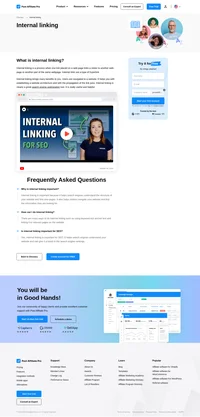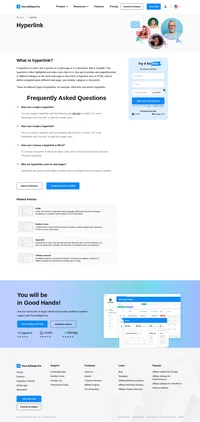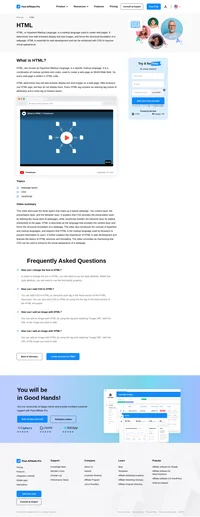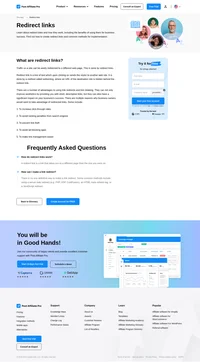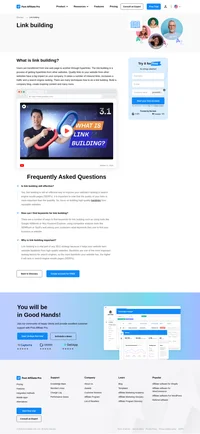What Are Reciprocal Links?
Reciprocal links are a mutual agreement between two websites to link to each other. Historically, these links were used extensively as a method to improve search engine rankings by enhancing a site’s backlink profile. This tactic involved both sites placing hyperlinks to each other, primarily to boost SEO, increase web traffic, and improve perceived authority.
However, with the evolution of search engine algorithms, particularly those of Google, the emphasis has shifted from the sheer quantity of backlinks to their quality and relevance. Reciprocal links now need to be approached with caution to avoid penalties and maintain SEO efficacy.
Importance and Role in SEO
Reciprocal links remain a component of SEO strategies but must be used judiciously. Correctly implemented, they can help establish strategic partnerships, enhance website authority, and drive valuable referral traffic. For niche or smaller websites, reciprocal links can be especially beneficial for gaining exposure within their industry.
However, excessive or irrelevant reciprocal linking can lead to penalties from search engines, including Google, which may view these links as attempts to manipulate ranking algorithms. This has been supported by findings from an Ahrefs study indicating that while reciprocal links are common, they must be implemented correctly to avoid SEO penalties.

Best Practices for Using Reciprocal Links
- Quality Over Quantity: Focus on exchanging links with websites offering high-quality, relevant content that aligns with your own audience and offerings. This means prioritizing partnerships where both parties’ content is complementary and beneficial to their respective audiences.
- Natural Integration: Ensure reciprocal links are naturally integrated within content and provide genuine value to users. Unnatural or forced link placements can harm site credibility and degrade user experience.
- Transparency: Clearly indicate the nature of the link exchange to maintain trust with both users and search engines. Transparency helps prevent links from being perceived as manipulative.
- Regular Audits: Conduct regular audits of your link profile to identify and address potential issues with reciprocal links. This includes monitoring SEO guideline changes and adapting strategies to remain compliant.
- Avoid Competitors: Link to sites with similar themes but avoid direct competitors, especially those targeting the same keywords, as this could inadvertently boost their SEO at your expense.
Impact on Affiliate Marketing and Software
Reciprocal links can be strategically used in affiliate marketing to build partnerships with marketers or platforms that complement one’s offerings. For instance, an affiliate marketer promoting software might exchange links with a blog that reviews tech products, providing mutual benefits of increased traffic and authority. However, these links must be relevant and add genuine value to both parties’ audiences to be effective and maintain integrity.
Potential Risks and Penalties
- Search Engine Penalties: Excessive reciprocal linking can violate search engine guidelines, leading to penalties such as lowered search rankings or de-indexing.
- Loss of Trust: Poorly executed reciprocal linking may result in a loss of trust from search engines and users if links appear spammy or irrelevant.
- Dilution of Link Value: Engaging in too many reciprocal link exchanges can dilute the value of each link, reducing its effectiveness in enhancing SEO.
Tools for Monitoring Reciprocal Links
To effectively manage reciprocal links, utilize tools like Google Search Console to track who is linking to your site and whether you are linking back. Such monitoring ensures your backlink profile remains balanced and compliant with SEO best practices.

Do Reciprocal Links Affect Your SEO? Insights for Affiliate Marketers
One question that often surfaces is whether reciprocal link building—where two websites agree to link to each other—can harm your organic rankings. This article unpacks the findings of a study conducted on 140,000 websites to shed light on the impact of reciprocal links on SEO, and how affiliate marketers can leverage this information to enhance their strategies.
Understanding Reciprocal Links
Reciprocal link building has been a longstanding tactic in the SEO toolkit. The concept is simple: "You link to me, and I'll link to you." However, Google's Webmaster Guidelines warn against "excessive link exchanges," categorizing them as a link scheme. So, the pertinent questions are: How prevalent are reciprocal links? And do they negatively impact SEO performance?
The Study: Key Findings
Prevalence of Reciprocal Links
The study analyzed 140,000 websites, each receiving a minimum of 10,000 monthly Google search visits. It focused on "dofollow" links, which pass SEO value between sites. The results were telling: 73.6% of the sampled domains had at least one reciprocal link. This suggests that reciprocal links are a natural part of the web's ecosystem.
Impact on SEO Rankings
To assess the impact on SEO, the study examined top-ranking pages for 10,000 non-branded queries with moderate keyword difficulty. A significant 43.7% of these top-ranking pages had reciprocal links. This indicates that while reciprocal links are common, they don't necessarily hinder ranking success.
Conclusion on Reciprocal Links
The study concludes that reciprocal links are a natural byproduct of the web. They should not be actively pursued as a primary SEO strategy, but neither should they be avoided if they occur naturally through content relevance and authentic relationships.
Practical Applications for Affiliate Marketers
For affiliate marketers, the key takeaway is relationship building. Authentic connections with other content creators can lead to natural reciprocal links, which are a byproduct of genuine engagement rather than forced exchanges.
Building Relationships
-
Identify Key Partners: Use tools like Ahrefs to find sites you frequently link to and those linking to you. These are potential partners for collaboration.
-
Outreach with Value: When reaching out, offer value first. Whether it's sharing insights, guest posting, or linking to their content, make your outreach beneficial to them.
-
Avoid Spammy Tactics: Refrain from sending generic emails asking for links. Instead, personalize your communication and focus on building a rapport based on mutual respect and shared interests.
FAQs
Q: Are reciprocal links against Google's guidelines? A: Excessive reciprocal linking is discouraged by Google, but natural, relevant links that occur as part of a genuine relationship are not penalized.
Q: How can affiliate marketers leverage reciprocal links? A: Focus on creating high-quality content and building authentic relationships. Natural reciprocal links will follow as a result of mutual respect and collaboration.
Q: Do reciprocal links help with SEO? A: While they are common among top-ranking pages, reciprocal links should not be the cornerstone of your SEO strategy. They are best viewed as a natural outcome of relationship-building efforts.
Conclusion
For affiliate marketers, the path to success lies in fostering genuine relationships rather than chasing after link exchanges. By focusing on creating valuable content and engaging with industry peers authentically, you can enhance your SEO efforts while building a robust network. Embrace the natural occurrence of reciprocal links as part of your broader strategy to grow your affiliate marketing business.
Ready to optimize your affiliate marketing strategy? Start building meaningful connections today and see the difference it makes in your SEO outcomes.
Frequently Asked Questions
Are reciprocal links good for SEO?
Reciprocal links can be good for SEO when done right and used sparingly. Keep in mind that excessive link exchanges are against Google’s Webmasters Guidelines and can end up hurting your site’s SEO.
Does reciprocal linking work?
Reciprocal links are two-way links between websites that can improve search engine optimization by increasing the link popularity of the site.
How common are reciprocal links on the web?
It is generally agreed that reciprocal linking is not as common as it once was. This is likely due to the fact that search engines now place less emphasis on link popularity than they did in the past.
Discover the power of link building with Post Affiliate Pro! Learn how acquiring quality backlinks can boost your website's traffic and search ranking. Explore techniques, from creating a compelling blog to building strong relationships, to enhance your SEO strategy. Visit us to elevate your digital presence today!

